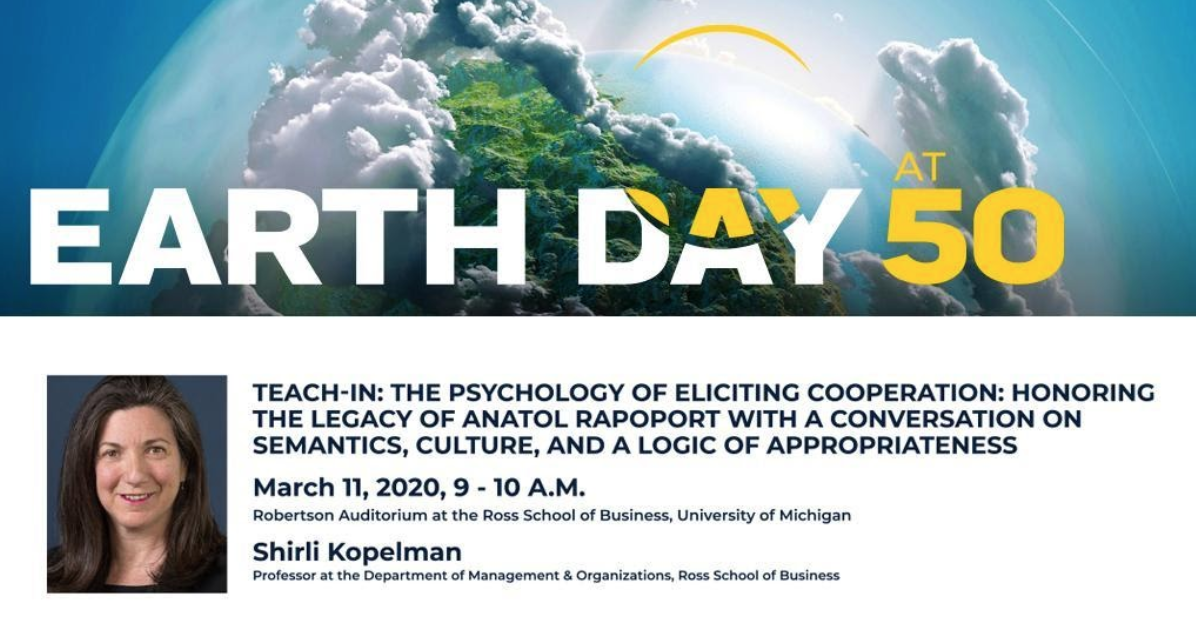Transforming the Debate: Negotiating Sustainable Peace à la Rapoport

What can a mathematician, peace activist, and environmentalist who came to prominence over half a century ago teach the business community in the 21st century?
Quite a bit, according to Michigan Ross Professor Shirli Kopelman, who has spent considerable time studying the legacy of Anatol Rapoport. In a recently published article celebrating his life and work, "Tit for Tat and Beyond: The Legendary Work of Anatol Rapoport," Kopelman highlights the scholarly contributions he made to game theory, complex systems, conflict and peace studies, as well as philosophy.
During the heart of an impressive academic career, from 1955 to 1970, Rapoport was a faculty member at the University of Michigan. He participated in the landmark historical Teach-In on the Environment, which led to the first Earth Day celebration in April of 1970. Fittingly, Kopelman discussed Rapoport’s legacy in a Teach-In at Michigan Ross this spring as part of the university’s Earth Day at 50 observances.

The discussion at Kopelman’s 2020 Teach-In emphasized the importance of semantics for eliciting cooperation in competitive social dynamics.
Kopelman noted that our words reflect how we think about people, society, and the environment. They distinguish between strategy and conscience. Quoting Rapoport’s Strategy and Conscience, Kopelman highlighted his assertion that game theory is not just a game:
"One cannot play chess if one becomes aware of the pieces as living souls and of the fact that the Whites and the Blacks have more in common with each other than with the players. Suddenly one loses all interest in who will be champion."
We can learn from economic games and rational choice theory, however, it is critical to consider what makes sense for people and groups facing conflict and environmental challenges. According to Rapoport, economic games provide a simple but dramatic demonstration of the sort of thinking that must be changed: thinking that equates rationality with pursuit of self-interest.
This caution came from a scholar, well known for the “Tit for Tat” strategy in the Prisoner’s Dilemma paradigm, who dedicated much of his career to game theory.
Whether considering the challenges of Rapoport’s era or those we face today, a different logic is necessary, Kopelman stressed. This different logic needs to be carefully conveyed: “Cleaning up the semantic smog” was critical in 1970, and is as necessary in 2020.
Words shape our thoughts, emotions, and actions. Kopelman discussed how words structure our social interactions and can advance collaboration that aligns individual and collective goals. We have opportunities today to fortify institutions that promote sustainable peace and well-being.
Rather than following a logic of rationality — considering what is individually rational (for me, my group, or my nation) — following a logic of appropriateness elicits human dynamics that foster cooperation.
Rather than asking “what is rational?” Kopelman suggests a question that considers four socially interdependent factors: “What does a person like me (identity) do (rules) in a situation like this (recognition) given the culture (group)?” Her empirical research on this four-factor culturally-informed logic of appropriateness illustrates that group values and norms impact how people interpret situational cues, such as power, and sheds light on nuanced dynamics of cooperation in multicultural negotiations.
As states and nations now consider steps for re-opening the economy in the face of the ongoing COVID-19 pandemic threat, opportunities are ripe for new collaborative initiatives. A debate has emerged: “Will the Coronavirus Crisis Trump the Climate Crisis?”
Kopelman emphasizes that Rapoport’s thinking applies directly to this debate, framing it as: “the strategy to get the economy going again, on the one hand, or, on the other hand, our conscience to innovate and rebuild local and global business ecosystems that balance the concerns for economic profits with fostering individual and social well-being in a sustainable natural environment.” Our choices matter.







